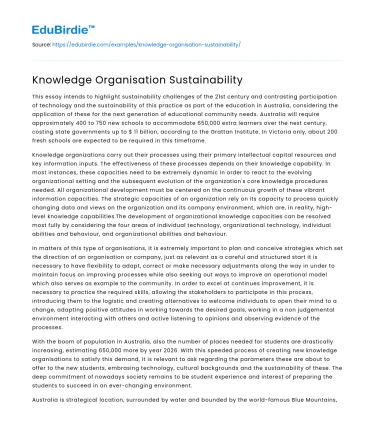Introduction
In the rapidly evolving landscape of information management, the sustainability of knowledge organisation systems (KOS) has emerged as a pivotal concern. Knowledge organisation encompasses the methodologies and practices employed to classify, store, retrieve, and disseminate information within various domains. As the volume of data grows exponentially, the sustainability of such systems becomes critical to ensure they remain functional, relevant, and adaptable over time. This essay examines the multifaceted dimensions of knowledge organisation sustainability, including technological advancements, economic considerations, and social impacts. By exploring these aspects, the essay aims to highlight the necessity for sustainable practices in the management of knowledge resources. Moreover, it addresses potential criticisms and challenges to propose a balanced and future-oriented approach to KOS sustainability.
Technological Advancements in Knowledge Organisation
Technological advancements form the backbone of sustainable knowledge organisation systems. One primary factor driving sustainability is the integration of artificial intelligence (AI) and machine learning (ML) in data management processes. AI and ML can enhance data classification and retrieval efficiency, reducing the manual effort required for these tasks. For instance, Google's Knowledge Graph exemplifies how AI can be leveraged to create interconnected data networks, thereby facilitating more intuitive search experiences (Singhal, 2012). This integration not only optimizes resource usage but also ensures that systems evolve with changing data landscapes.
Save your time!
We can take care of your essay
- Proper editing and formatting
- Free revision, title page, and bibliography
- Flexible prices and money-back guarantee
However, technological reliance also presents challenges. The rapid pace of technological change can render systems obsolete if they lack adaptability. This necessitates the development of dynamic systems that can incorporate emerging technologies without significant overhauls. Furthermore, issues such as data privacy and security must be addressed to maintain user trust and compliance with regulatory frameworks. As noted by Berners-Lee (2018), the ethical implications of data usage must be integral to the design of sustainable KOS. By balancing technological innovation with ethical considerations, organisations can create resilient systems that support long-term knowledge management goals.
Economic Considerations in Sustaining Knowledge Systems
Economic factors play a crucial role in the sustainability of knowledge organisation systems. The cost of implementing and maintaining sophisticated KOS can be prohibitive, particularly for smaller organisations or those in developing regions. To mitigate these challenges, it is essential to explore cost-effective solutions and collaborative models. Open-source software offers one such solution, providing organisations with access to robust tools without the high costs associated with proprietary systems. For example, platforms like Koha and DSpace demonstrate how open-source initiatives can support sustainable library and digital repository management (Smith, 2014).
Additionally, sustainable economic models often involve partnerships and collaborations that leverage shared resources. By participating in consortia, organisations can distribute the financial burden of maintaining complex systems while benefiting from collective expertise and infrastructure. Despite these advantages, economic sustainability is frequently challenged by short-term budget constraints and the prioritisation of immediate needs over long-term investment. Addressing this requires strategic planning and a shift in organisational culture towards recognising the value of sustained knowledge management as a critical asset.
Social Impacts and the Future of Knowledge Organisation
The social dimension of knowledge organisation sustainability encompasses the accessibility and inclusivity of information systems. Ensuring that KOS are accessible to diverse user groups is crucial for promoting equity and fostering a knowledge-driven society. The implementation of user-friendly interfaces and multilingual support can enhance accessibility, enabling broader participation in the information economy. Additionally, inclusive design practices must account for individuals with disabilities, ensuring that systems adhere to universal design principles.
The future of sustainable knowledge organisation also hinges on fostering a culture of continuous learning and adaptation. Organisations must invest in training and development programs to equip staff with the skills necessary to manage evolving systems. This not only enhances system resilience but also supports employee engagement and innovation. As noted by Drucker (1999), the ability to adapt and learn continuously is a hallmark of successful and sustainable organisations. By prioritising social sustainability, knowledge organisations can contribute to a more equitable and informed global community.
Conclusion
In conclusion, the sustainability of knowledge organisation systems is a multifaceted issue that demands attention to technological, economic, and social dimensions. While advancements in AI and ML present opportunities for enhanced efficiency and adaptability, they must be balanced with ethical considerations to ensure trust and compliance. Economically sustainable models, such as open-source initiatives and collaborative partnerships, offer viable pathways for organisations to manage costs while maintaining robust systems. Social sustainability, focusing on accessibility and inclusivity, is equally critical in ensuring that knowledge systems serve the diverse needs of society. By addressing these interconnected aspects, organisations can create resilient and sustainable knowledge management frameworks that support long-term organisational and societal goals.






 Stuck on your essay?
Stuck on your essay?

